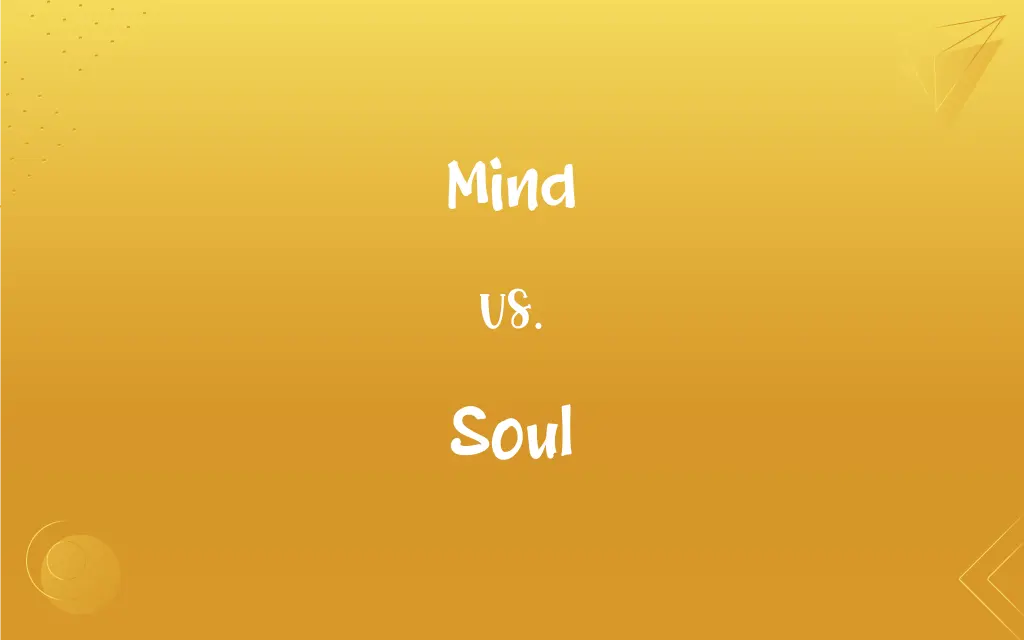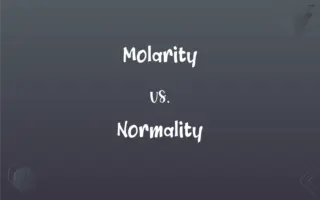Mind vs. Soul: What's the Difference?
Edited by Aimie Carlson || By Harlon Moss || Updated on October 17, 2023
The mind is the seat of consciousness and thought; the soul is the spiritual or immaterial essence of a being.

Key Differences
The mind is often understood as the cognitive faculties encompassing thought, perception, consciousness, and memory. It is where processes like reasoning, decision-making, and problem-solving take place. The soul, by contrast, is a more abstract concept, often linked to spirituality, ethics, and individual essence.
Many believe the soul to be eternal and the core of a person's being. While the mind can be measured, analyzed, and observed to a certain extent through cognitive studies and neuroscience, the soul eludes such empirical grasp, often being the subject of religious and philosophical discourse.
Both the mind and soul contribute to the human experience, but they operate on different realms. The mind engages with the tangible, the logical, and the immediate, while the soul concerns itself with the intangible, the moral, and the eternal.
Understanding oneself often involves introspection of both the mind's logic and the soul's deeper desires and beliefs.
Comparison Chart
Nature
Cognitive and intellectual faculties.
Spiritual or immaterial essence.
ADVERTISEMENT
Associated With
Thinking, reasoning, consciousness.
Spirituality, essence, eternity.
Measurement
Can be studied and analyzed (e.g., through neuroscience).
Eludes empirical measurement; often a matter of belief.
Relates to
Tangible, logical experiences.
Intangible, moral, and eternal aspects.
Concern
Immediate experiences, decision-making.
Deeper desires, beliefs, and one's eternal essence.
Mind and Soul Definitions
Mind
The set of cognitive faculties.
Her sharp mind quickly solved the puzzle.
ADVERTISEMENT
Soul
The moral or emotional nature of a person.
Her soul was kind and compassionate.
Mind
The origin of one's perceptions, emotions, and reactions.
Fear was playing tricks on her mind.
Soul
The core identity or true self.
He bared his soul during the heartfelt confession.
Mind
The center of thought and consciousness.
He changed his mind after hearing the other side of the story.
Soul
The spiritual or immaterial essence of a being.
Music speaks directly to the soul.
Mind
The seat of awareness and intellect.
Meditation helps in clearing the mind.
Soul
The embodiment of sentiment and consciousness.
The city had a soul of its own, full of vibrancy.
Mind
The determinant of individual thought processes.
Every creative mind has its unique approach.
Soul
The eternal aspect of one's existence.
Many believe the soul transcends death.
Mind
The faculty of a human or other animal by which it thinks, perceives, feels, remembers, or desires
Studying the relation between the brain and the mind.
Soul
A part of humans regarded as immaterial, immortal, separable from the body at death, capable of moral judgment, and susceptible to happiness or misery in a future state.
Mind
A person of great mental ability
The great minds of the century.
Soul
This part of a human when disembodied after death.
FAQs
What functions does the mind primarily handle?
The mind handles thought, reasoning, consciousness, and memory.
Is the mind synonymous with the brain?
While the brain is a physical organ, the mind refers to cognitive processes and consciousness.
How is the soul typically defined?
The soul is seen as the spiritual or immaterial essence of a being.
Is the soul tangible or intangible?
The soul is generally considered intangible and a matter of personal belief.
Are beliefs about the soul consistent across cultures?
No, beliefs about the soul vary widely across cultures and religions.
How do emotions relate to the mind and soul?
Emotions can be products of the mind's processes, but some believe they connect deeply with the soul.
Can the mind be observed or studied?
Yes, the mind can be studied through cognitive sciences and neuroscience.
Is the soul associated with any particular religion?
Concepts of the soul appear in many religions, each with its own interpretation.
Is mental health directly linked to the mind's condition?
Yes, mental health relates to the mind's well-being and cognitive processes.
What's the role of the soul in morality?
Many believe the soul guides moral decisions and reflects one's true character.
Is the soul believed to exist after death?
Many religions and philosophies believe the soul continues to exist or undergoes reincarnation after death.
Can the mind exist without the brain?
Scientifically, the mind's processes are closely linked to brain activity.
Do animals have souls?
This is a matter of personal belief; some religions and philosophies posit that animals have souls.
How do thoughts originate in the mind?
Thoughts can arise from stimuli, memories, emotions, or intricate neural processes.
Is the soul believed to have a specific location?
While some traditions might assign the soul a "location" (like the heart), it's generally seen as non-physical and omnipresent within an individual.
Can the mind be trained or enhanced?
Yes, through practices like education, meditation, and cognitive exercises, the mind can be honed.
How do memories relate to the mind?
Memories are stored and retrieved by the mind, shaping one's perceptions and identity.
Can the mind be unconscious?
Yes, the mind can operate on unconscious levels, influencing behavior without awareness.
How do meditation and spirituality relate to the mind and soul?
Meditation often seeks clarity of the mind, while spirituality might address the soul's journey and purpose.
Can one's soul change over time?
Philosophical and religious views differ; some believe souls are immutable, while others think they evolve.
About Author
Written by
Harlon MossHarlon is a seasoned quality moderator and accomplished content writer for Difference Wiki. An alumnus of the prestigious University of California, he earned his degree in Computer Science. Leveraging his academic background, Harlon brings a meticulous and informed perspective to his work, ensuring content accuracy and excellence.
Edited by
Aimie CarlsonAimie Carlson, holding a master's degree in English literature, is a fervent English language enthusiast. She lends her writing talents to Difference Wiki, a prominent website that specializes in comparisons, offering readers insightful analyses that both captivate and inform.







































































